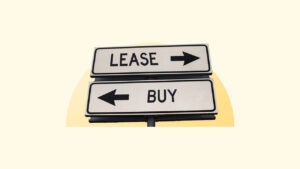How much car can I afford? How to estimate your payment




Key takeaways
- The amount you can afford for a car depends on whether you’re buying or leasing — the latter could be much cheaper and let you access more options.
- Your salary, debt-to-income ratio and credit profile could also affect how large of a car loan you’ll be offered.
- Be sure to factor in car-related expenses, like auto insurance, fuel and maintenance costs, to ensure you can comfortably afford your new ride.
How much car you can afford depends on your monthly income, credit score and down payment. A good monthly payment isn’t too big to be manageable, but it also isn’t so small that it stretches out your loan term. On top of your monthly payment, experts typically recommend spending no more than 20% of take-home pay on a car. That should include the cost of car payments, fuel, insurance and more. Review your monthly budget and use an auto loan calculator to decide what monthly payment and term suit you.
How to calculate how much car you can afford
Setting a budget and comparison shopping vehicles will keep you from overspending or choosing a car that you later regret. A little upfront planning can also give you confidence when you’re ready to commit to an auto loan and a new set of wheels.
1. Decide between new, used or lease
Whether you’re leasing or buying a car — and whether that car is new or used — makes a difference in what you can afford.
Use a leasing versus buying calculator to calculate your potential savings. What is affordable comes down to how you plan to use your vehicle, so read up on the full benefits and drawbacks of each before you commit.
When to lease
Leasing is a great option for drivers who want a lower monthly payment and the ability to drive the newest models. Your payments cover the vehicle’s depreciation rather than its total value. However, you still need to put money down — and you’ll be paying to maintain a car you ultimately will not own. You’ll also face mileage restrictions.
When to buy
Buying places you fully in the driver’s seat with no mileage limits or additional charges for wear and tear. It costs more to buy a car than to lease it, you risk being upside-down on a loan if you end up owning more than the vehicle is worth. But you will own the car and be able to sell it if needed.
If you decide to buy a car, you will need to choose between a new or used vehicle. A new car offers the latest features and some customization, but it also depreciates faster and comes with a higher price tag. A used car may have higher maintenance costs, and sometimes the difference in monthly payments is very small.
A good monthly payment isn’t too big to be manageable, but it also isn’t so small that it stretches out your loan term. A longer term will cost you money in interest. Review your monthly budget and use an auto loan calculator to decide what monthly payment and term suit you.
2. Consider your salary
Your salary is one of the primary factors in determining which auto loan is best for you. Edmunds recommends that a new car payment be no more than 15 percent of your monthly take-home pay. A used car payment should be no more than 10 percent, but that number can vary depending on if it’s a certified pre-owned car or a newer model.
To determine how much car you can afford, divide your annual income by 12, then multiply that number by the percent of your budget you want it to take up. Here are example monthly car payment limits based on how much of your income you want to spend on a vehicle:
| Annual income | 10% of monthly budget | 15% of monthly budget | 20% of monthly budget |
|---|---|---|---|
| $30,000 | $250 | $375 | $500 |
| $50,000 | $417 | $625 | $833 |
| $70,000 | $583 | $875 | $1,166 |
| $90,000 | $750 | $1,125 | $1,500 |
| $120,000 | $1,000 | $1,500 | $2,000 |
| $140,000 | $1,167 | $1,750 | $2,333 |
When insurance, fuel and other regular monthly expenses are included, the cost should not exceed 20 percent of your monthly take-home pay. Even if you have the cash available to pay for your car outright, you should still consider your purchase in the full context of your annual salary and expenses. Specifically, weigh buying in cash — and possibly eating into or wiping out your emergency fund — versus making affordable payments over time.
By putting down money on your car upfront, you reduce the amount you need to finance and could qualify for a better interest rate. That helps make your loan more affordable. It also gives you more equity in your vehicle, reducing your risk of becoming underwater on your loan. And to make a larger down payment, consider that you could use the cash from selling your potential trade-in.
3. Estimate your monthly car payments
You can estimate your interest rate on a car loan by checking the average auto loan interest rates by credit score.
The interest rate you receive on an auto loan plays a big part in how much car you can afford and your monthly payment amount. A higher credit score will often lead to a lower interest rate, which will ultimately lower your monthly payment and your total overall loan cost.
Then, with the help of a car loan calculator, you can determine how different interest rates will affect your monthly payment.
4. Apply for preapproval
A preapproved auto loan shows that a lender — whether it be a bank, credit union or other financial institution — has agreed to offer you funding under certain conditions. It provides the loan amount, interest rate and terms they are willing to give you. With preapproval in hand, you can approach the dealership like a cash buyer, and if the dealership wants to offer you financing, its finance office will have to beat the offer you already have.
Before offering preapproval, lenders will review your credit score, your income and your debt-to-income ratio, or DTI. This measure compares your monthly bills to your gross monthly income. In addition to making dealership negotiations easier, a big advantage for you as a buyer is that preapproval shows you how much you can afford and what your monthly payment will look like. That helps you decide what vehicles are realistically in your budget.
Preapproval is the specific terms the lender is willing to commit to. Prequalification is an estimate of the terms a lender will offer you and does not have the same leverage as preapproval.
5. Determine your out-the-door price
The payments on your vehicle loan will include more than just the cost of the vehicle alone. Be mindful of the out-the-door (OTD) price, which will factor in not only the cost of your vehicle but also taxes, fees and any add-ons you purchase. Consumer advocates generally agree that most add-ons, such as window etching, are either worthless or not worth the price dealers charge.
With research, you can learn what to expect in state sales taxes and title and vehicle registration fees. While some dealer fees are required by law or company policy, others may be on the table for negotiation or removal. Understanding what is and isn’t open for discussion can save time and frustration at the negotiation table.
With an affordable OTD price in mind, you can aim for a certain sticker price while shopping for a vehicle. Understand that your OTD price will add between 10 and 15 percent to your car’s price, depending on your locale.
6. Factor in additional vehicle costs
Your monthly payment is only one of the many costs of vehicle ownership. Fuel, insurance and maintenance are all factors when determining how much car you can afford.
- Research fuel efficiency. Search fueleconomy.gov for mileage estimates for your car. Selecting a car with good gas mileage will save you money each month and could help you maximize any employer mileage reimbursements.
- Check insurance rates. Adding a different car to your policy will affect your rate. Use a car insurance calculator to understand your potential insurance costs. For context, the average annual premium was $2,638 in 2025, over a 12% increase from the year before, according to Bankrate’s true cost of auto insurance report.
- Calculate cost of ownership. Edmunds and Kelley Blue Book have cost-to-own tools that account for expected fuel costs, maintenance, repairs, state fees and average depreciation that can help you factor in additional expenses when developing your vehicle budget.
Bottom line
Being realistic with your budget will help you avoid pinching pennies after bringing your new ride home. Before settling on a car, consider all potential costs, not just the monthly payment. Aim to find a car that costs no more than 20 percent of your take-home pay.
The goal is to find a car that meets your expectations and leaves you with money to cover unforeseen costs or income changes.
Why we ask for feedback Your feedback helps us improve our content and services. It takes less than a minute to complete.
Your responses are anonymous and will only be used for improving our website.





